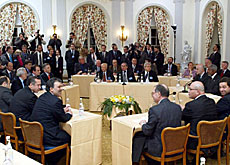Diplomat puts positive spin on Bürgenstock talks

As a special legal adviser to the United Nations, Swiss diplomat Didier Pfirter has been heavily involved in the reunification plan for Cyprus.
As five days of intense negotiations in Switzerland drew to an end, swissinfo asked Pfirter for his assessment of how the talks had gone.
Greek and Turkish Cypriot leaders left the Bürgenstock resort near Lake Lucerne without having reached an agreement on the UN’s 9,000-page plan.
But Pfirter believes there is still time to iron out differences before both sides of the island vote on the document in referendums on April 24.
swissinfo: What was the main stumbling block in the talks?
Didier Pfirter: From the beginning it was never foreseen that the parties would have to necessarily come to an agreement. It had been planned that the [United Nations] secretary-general [Kofi Annan] would complete a text that would be submitted for a referendum. It was desirable that both sides sign a text, but that was never a very realistic expectation.
swissinfo: Do you feel there was some success despite this?
D.P.: I think it was a great success. For the first time in the 40 years of the Cyprus conflict there is a plan on which the people can have their say and which answers all the questions being asked.
The comprehensive plan has over 9,000 pages, and the parties have agreed upon 8,900. So the amount of disagreement is very small. The spotlight was on a few politically contentious points, upon which there was no agreement and where the secretary-general had to bridge the gap.
On the island, there are hundreds of people working away, negotiating and finalising all these thousands of pages of laws and regulations, and reaching agreement on virtually everything.
swissinfo: It appears that the Greeks were unhappy with Kofi Annan’s plan. Is this the case?
D.P.: I don’t think so. I think a lot of negotiation tactics came into play. Given that the Greek Cypriots are almost in the European Union, they may have considered themselves to be in a stronger negotiating position than they were a year ago. They probably thought they would be able to substantially alter the balance in their favour. That has not happened, so they might be disappointed.
The secretary-general has maintained the balance of his plan from the start and I think he has managed to improve the plan for both sides. I don’t think either side would deny that.
That this was achieved is no small thing. When you have a plan that has already been revised twice, you start to run out of constructive ideas.
swissinfo: A referendum on this plan will be held by both sides on April 24. What are its chances of being accepted?
D.P.: It is far too early to say. It is no secret that the opinion polls are currently negative, especially on the Greek Cypriot side, but then nobody has started campaigning in favour of this plan.
Up until now, it was almost as if people who supported it on the Greek side were considered traitors, because you were seen as weakening the negotiating position. Now, people can show their true colours; they no longer need to pretend for negotiating reasons. I think attitudes could change quickly.
swissinfo: What does it mean for Cyprus and EU membership if the plan is rejected?
D.P.: In the short term, it doesn’t change anything since Cyprus will still join the EU. But it means that only the Greek Cypriot side will benefit from membership. But if the Turkish Cypriots accept the plan and the Greek side rejects it, the EU may change its stance towards the Turkish community and may try to give them a more favourable status.
It could all end in permanent partition for the island, or another referendum could be held in six months’ time. This all depends on developments and the attitude other European countries and the world will take towards Cyprus.
swissinfo: Do you think the Bürgenstock talks will go down in history as a milestone?
D.P.: Definitely. Never before has there been such a comprehensive peace plan, so I think it is a landmark no matter what the outcome.
swissinfo-interview: Billi Bierling
Greek and Turkish Cypriots will vote on the UN reunification plan in referendums on April 24.
The island of Cyprus has been divided into a Turkish north and a Greek south since 1974.
Reunification must be agreed on before European Union enlargement on May 1, if the whole of the island is to become an EU member.

In compliance with the JTI standards
More: SWI swissinfo.ch certified by the Journalism Trust Initiative

You can find an overview of ongoing debates with our journalists here. Please join us!
If you want to start a conversation about a topic raised in this article or want to report factual errors, email us at english@swissinfo.ch.